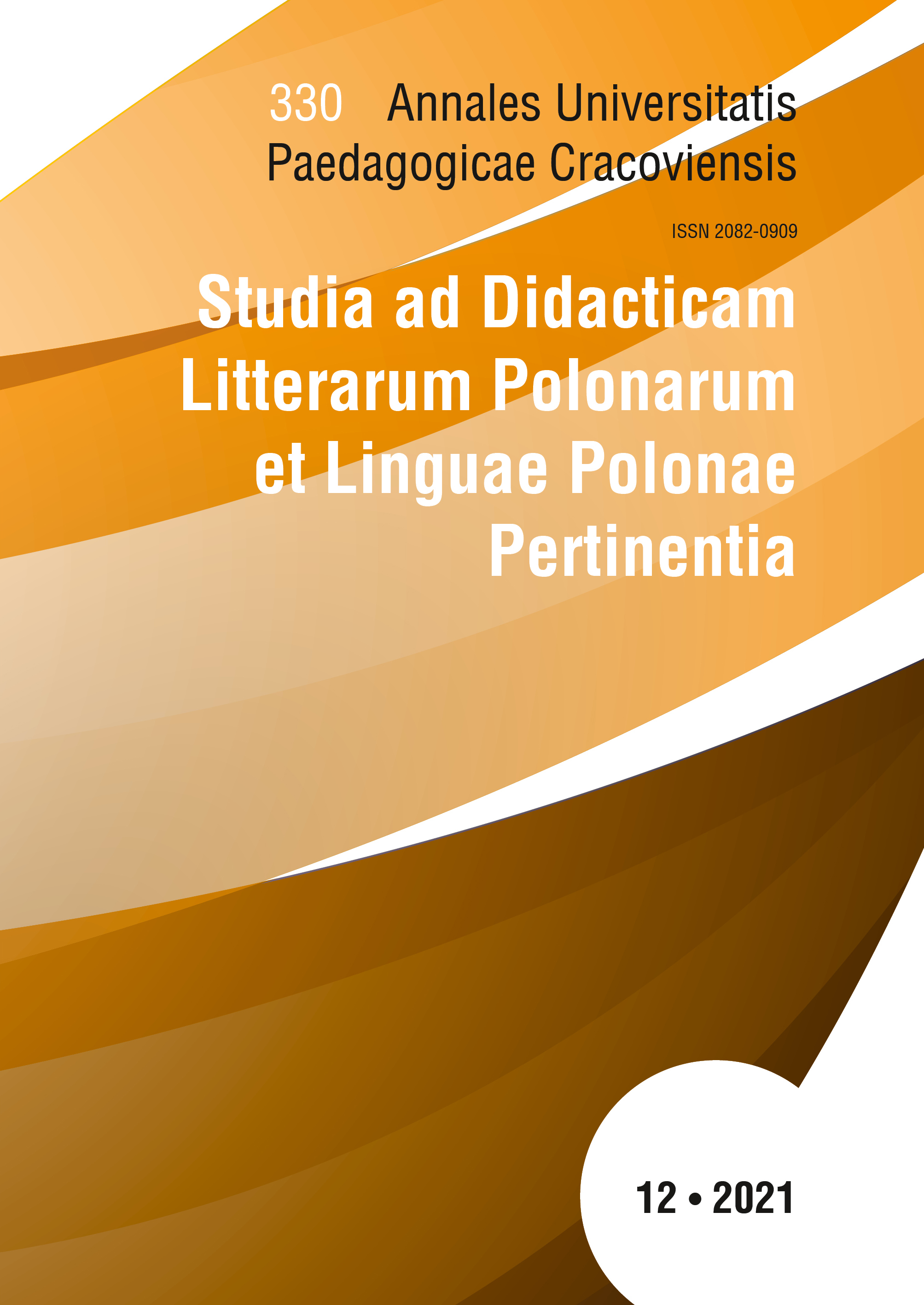Abstract
The article presents the results of the study of students’ language competences who attend the first secondary school classes. In 2019, as a result of the education reform, two groups of students started their education in the first grades: junior high school graduates and eight-grade primary school graduates. Pre-secondary education in the case of students leaving primary school lasted a year shorter. Both groups took the exam at the end of lower junior high school or elementary school, respectively, and studied according to a different core curriculum.
During the study, it was assumed that thanks to the education that lasted a year longer and was based on a different core curriculum, lower secondary school students should achieve better results in terms of creating an argumentative text and in terms of selected language skills. Both groups of students wrote the same test to confirm or reject the thesis.
The results of the study showed that both groups of students achieved comparable results. In some areas, younger students have even outranked junior high school students. At the same time, it turned out that the lower stage of education was completed by students with very different competences. Both among junior high school and primary school students there are very good and very weak students, while in the group of junior high school students there is a large percentage of very weak students. This may prove that for many students three years of lower secondary school were a waste of time, and the last two years of primary school were enough to master the tested skills.
References
Jakubowski M., Smulczyk M., Walicki P., Gimnazja pomagają, „Głos Nauczycielski” 2016, nr 50, b.n.s. http://www.evidin.pl/ wp-content/ uploads/publications/ edu-pod-lupa/ EDUPODLUPA-Gimnazja- pomagaj%C4%85.pdf [dostęp: 15.01.2021].
##plugins.generic.googleScholarLinks.settings.viewInGS##
Latoch-Zielińska M., Stracone pokolenie? O trudnościach siódmoklasistów z realizacją nowej podstawy programowej z j. polskiego, „Annales Universitatis Paedagogicae Cracoviensis. Studia ad Didacticam Litterarum Polonarum et Linguae Polonae Pertinentia” 2019, t. X, nr 285, s. 52–66.
##plugins.generic.googleScholarLinks.settings.viewInGS##
Myrdzik B., Czy „ nowe” jest nowe, czy też jest „poligonem orwellowskiej utopii”? Refleksje na temat ostatniej reformy edukacyjnej, „Annales Universitatis Paedagogicae Cracoviensis. Studia ad Didacticam Litterarum Polonarum et Linguae Polonae Pertinentia” 2019, t. X, nr 285, s. 9–16.
##plugins.generic.googleScholarLinks.settings.viewInGS##
Piotrowski M., Monitoring kompetencji szkolnych w środowisku lokalnym: wyzwania, „Studia z Teorii Wychowania” 2017, nr 8/2 (19), s. 91–112.
##plugins.generic.googleScholarLinks.settings.viewInGS##
Podstawa programowa kształcenia ogólnego z komentarzem. Szkoła Podstawowa. Język polski, http://www.bc.ore.edu.pl/dlibra/doccontent?id=232 [dostęp: 15.01.2021].
##plugins.generic.googleScholarLinks.settings.viewInGS##
Podstawa programowa z komentarzami. Tom 2. Język polski. Szkoła podstawowa, gimnazjum, liceum, http://www.bc.ore.edu.pl/dlibra/doccontent?id=232 [dostęp: 15.01. 2021].
##plugins.generic.googleScholarLinks.settings.viewInGS##
Sporek P., Suma wszystkich strachów, czyli rok z życia pewnej siódmej klasy albo już za rok matura, „Annales Universitatis Paedagogicae Cracoviensis. Studia ad Didacticam Litterarum Polonarum et Linguae Polonae Pertinentia” 2019, t. X, nr 285, s. 39–51.
##plugins.generic.googleScholarLinks.settings.viewInGS##
Szmigiel M.K., Szaleniec H., Uczniowie na progu transformacji szkoły, 2019, http://www.ptde.org/ pluginfile.php/1424/ mod_page/content/8/ Uczniowie%20na% 20progu.pdf [dostęp: 15.10.2021].
##plugins.generic.googleScholarLinks.settings.viewInGS##
Szymańska M., Między nauką o języku a rozwijaniem języka. Koncepcje kształcenia językowego na przełomie XX i XXI wieku, Kraków 2016.
##plugins.generic.googleScholarLinks.settings.viewInGS##
Tabisz A., Kompetencja tekstotwórcza uczniów na przykładzie rozprawki, Opole 2006.
##plugins.generic.googleScholarLinks.settings.viewInGS##
Trysińska M., Kształcenie językowe a kompetencje tekstotwórcze – raport z badań, „Didaktické Studie” 2020, ročník 12, číslo 1, s. 113–133.
##plugins.generic.googleScholarLinks.settings.viewInGS##
Trysińska M., Rozprawka szkolna – między schematyzmem a kreatywnością, [w:] Kompetencje nauczyciela polonisty we współczesnej szkole. Między schematyzmem a kreatywnością, red. K. Maciejak, M. Trysińska, Warszawa 2019, s. 165–184.
##plugins.generic.googleScholarLinks.settings.viewInGS##

This work is licensed under a Creative Commons Attribution-NonCommercial-ShareAlike 4.0 International License.
Copyright (c) 2021 Annales Universitatis Paedagogicae Cracoviensis. Studia ad Didacticam Litterarum Polonarum et Linguae Polonae Pertinentia

